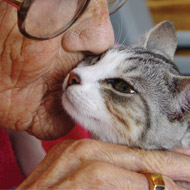
How caring for pets is proven to boost mental health
We all know that pets can provide companionship, love and are a great source of motivation. But in recent years, an increasing number of studies have shown that pets can also help us to live mentally healthier lives.
In December 2016, research by the University of Manchester found that pets can help with the management of long-term medical health conditions. In the study, 54 adults with severe mental illnesses were asked to rate the importance of their family, friends, pets, healthcare professionals and hobbies.
Interestingly, 60 per cent of participants stated that pets were 'most important' to them and 20 per cent said that pets were 'of secondary importance'. When asked to give their reasons, the participants said that the consistent presence of pets provided an immediate source of calm. Some also felt that their pets helped to distract them from their symptoms and offered valuable support during times of crisis.
To continue reading, please visit vetcommunity.com.



 The Veterinary Medicines Directorate (VMD) is inviting applications from veterinary students to attend a one-week extramural studies (EMS) placement in July 2026.
The Veterinary Medicines Directorate (VMD) is inviting applications from veterinary students to attend a one-week extramural studies (EMS) placement in July 2026.